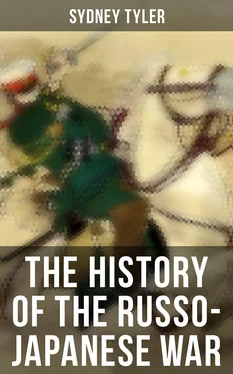But the command of the sea was the essential condition to attack by land by either combatant. With the Russian fleet masked or destroyed, Japan could choose as a landing-place for her armies any of the numerous ports on the western coast of Korea, and so approach in force the Yalu River, which divides Korea from Manchuria and the Liao-tung Peninsula. With imperfect command of the sea, Japan would have a second resource. She could land her troops at Masampo, separated only by a hundred miles of sea from her own ports, or she could, at a push, land her forces on the east coast of Korea, at Yuen San or Gensan. But the former plan of operations would have entailed a long overland march before the objective was reached, and the latter the maintenance of communications over difficult and mountainous country. Evidently, then, immeasurable importance attached to the result of the first naval engagements, and to their influence in giving the command of the sea to the one or the other of the two belligerent Powers.
On February 5th M. Kurino, the Japanese Minister at the Court of St. Petersburg, announced to the Government of the Czar that Japan could wait no longer for the long-delayed Russian reply, and that further negotiations were broken off. This startling news reached Europe and America on the evening of Sunday, February 7th; and while its significance was still being anxiously discussed in every capital, and while statesmen and jurists were still trying to convince one another that the rupture of diplomatic negotiations did not necessarily imply the beginning of war, there burst like a thunder-clap the further news that the first grim and irretrievable blow had been struck. Having decided that the arbitrament of war was inevitable, Japan acted on her decision with swift and terrible effect. On the night of Monday, February 8th, a daring attack by torpedo-boats was made on the Russian fleet lying at anchor in the Port Arthur roadstead, and at one fell swoop the boasted might of Russia at sea was hopelessly broken. This astounding intelligence was first conveyed to the world in an official telegram from Admiral Alexeieff to the Czar, couched in the following terms:—
"I most devotedly inform your Majesty that about midnight between the 26th and 27th of January (February 8th and 9th) Japanese torpedo-boats delivered a sudden mine attack on the squadron lying in the Chinese roads at Port Arthur, the battleships Retvisan and Czarevitch and the cruiser Pallada being holed. The degree of seriousness of the holes has to be ascertained. Particulars will be forwarded to your Imperial Majesty."
The stunning effect of this news was only enhanced when fuller details of the incident so baldly and laconically announced came to hand. No news of the movements of the Japanese fleet had been allowed to leak out, and its presence before Port Arthur was wholly unexpected by others as well as the Russians. On the 3rd of February the Russian fleet had put to sea, and for twenty-four hours the world was agog with the news of so momentous a movement. But the speculation died suddenly when it appeared that the fleet had returned immediately to its anchorage. The Japanese, with characteristic alertness, realized the splendid opportunity which the necessarily exposed position of the Russian ships afforded to an enterprising enemy.
While everything was still tranquil at Port Arthur, and the Russian authorities were confidently announcing that the foe could not be expected for three or four days, the blow fell. According to the graphic account of an eye-witness, every one at Port Arthur had settled down for the night, when suddenly across the bay reverberated the shock of three violent and successive explosions. In a moment all was bustle and confusion on the Russian warships. Searchlights flashed bewilderingly and without purpose across the waters, and quick-firing guns from vessel after vessel began a panic fusillade, which Admiral Alexeieff, in his official report, euphemistically described as "a well concentrated fire at the right time."
It was midnight, and in the darkness and confusion it was impossible for any one to know exactly what was happening; but when the morning light broke over Port Arthur the two proudest possessions of the Russian fleet, the powerful battleships Retvisan and Czarevitch , were seen passing slowly towards the harbor entrance, across which they presently lay in evidently a badly damaged condition. The cruiser Pallada followed, listing heavily to port, and she also was grounded outside the entrance to the harbor.
It was at ten o'clock the next day, the 9th of February, that the Russians obtained their first glimpse of the enemy. In the distance three Japanese cruisers were described hanging observant upon the Russian fleet, and immediately what remained of that once powerful squadron put to sea in pursuit of the audacious enemy. But, as before, this bold movement had no result, and the Russian ships returned to anchor. Scarcely had they done so when the Japanese squadron of sixteen vessels, including six battleships and four first-class cruisers, steamed into view in fighting formation. As the leading vessels at a distance of some three miles came into line with the harbor entrance the flash of their great guns broke through the mist, and for nearly an hour the Japanese shells continued to burst over the forts, along the beach and among the Russian ships, who replied vigorously, and whose fire was assisted by that of the powerful land batteries. Again the Russian squadron steamed out to meet the enemy.
Some of the cruisers advanced towards the Japanese fleet with great gallantry, the Novik , the Diana , and the Askold particularly distinguishing themselves, with the result that they were all rather seriously hit by the Japanese fire and were compelled to retire upon the main squadron. Several other of the Russian ships were damaged before the Japanese fleet drew off.
The official dispatch of Admiral Togo to his Government upon the momentous achievements of his fleet during these two days was a model of modesty and self-restraint. Dated "February 10th, at Sea," it ran:—
"After the combined fleet left Sasebo, on the 6th, everything went off as planned. At midnight on the 8th the advance squadron attacked the enemy's advance squadron, the latter being mostly outside the bay. The Poltava , Askold and others were apparently struck by torpedoes.
"At noon on the 9th the fleet advanced to the offing of Port Arthur Bay and attacked the enemy for forty minutes, I believe doing considerable damage. I believe the enemy were greatly demoralized. They stopped fighting at one o'clock, and appeared to retreat to the harbor.

| GENERAL KUROKI. |
|
GENERAL OKU. |
|
MARSHAL OYAMA. |
|
| GENERAL NODZU. |
|
GENERAL NOGI. |
JAPANESE GENERALS.
"The Japanese fleet suffered but very slight damage, and its fighting strength is not decreased. Our casualties were 4 killed and 54 wounded. The Imperial Princes on board suffered no harm.
"The conduct of the officers was cool, and not unlike their conduct at manœuvres.
"This morning, owing to heavy south wind, detailed reports from the vessels have not been received, so I merely report the above fact."
This dispatch, as we know both from the Russian official accounts and from independent witnesses, really understated the extent of the blow which the Japanese Admiral had dealt to the Russian fleet; the vessels torpedoed were not cruisers only, but the two crack battleships upon which Admiral Alexeieff necessarily placed peculiar dependence, and the "considerable damage" which Admiral Togo believed had been done by the subsequent bombardment had put out of action, for the time being, the battleship Poltava and the cruisers Diana, Askold and Novik. Of these the Poltava and the Novik were badly hit on the water line—damage the seriousness of which needs no comment.
Читать дальше













